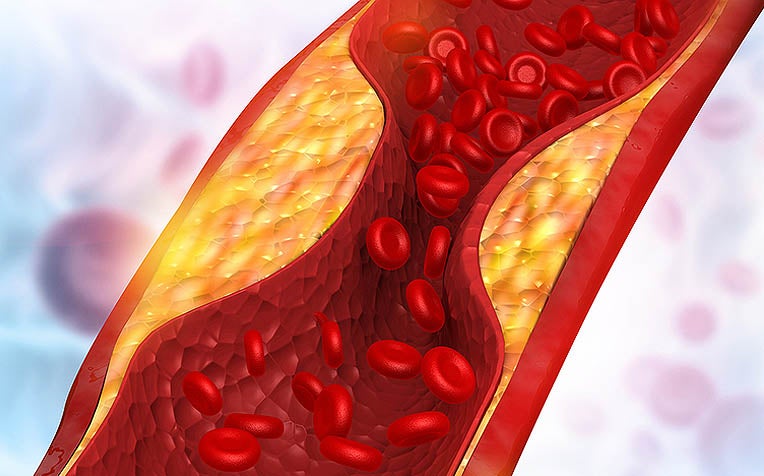
Triglycerides build-up can lead to hardening of the arteries (also known as atherosclerosis), which increases risk of stroke, heart attack (myocardial infarction) and heart disease.
“Triglycerides are a type of fat (lipid) found in the blood. Your body converts the food you eat into calories. However, if these calories aren’t used, they get stored in your cells as triglycerides,” explains Dr Apurva Thanju, Senior Staff Registrar from Sengkang Community Hospital (SKCH) at SingHealth Community Hospitals (SCH), a member of the SingHealth group.
Thus,
if you usually consume more high-carbohydrate foods than you burn, you may have a high triglyceride level.
6 Natural ways to lower triglycerides
To lower your triglyceride levels, making healthy lifestyle changes is key:
1. Maintain a healthy weight
As Asians have a higher risk of health problems at a lower BMI compared to Caucasians, strive to achieve a healthy BMI of between 18.5 to 22.9 kg/m2.
A BMI ranging from 23.0 to 27.4 kg/m2 puts you at moderate risk for health problems, while a BMI at 27.5 kg/m2 and above puts you at high risk. Also, the ideal waist circumference cut-off for Asian men is 90cm, while for Asian women it is 80cm.
If you have mild to moderate triglyceride levels, focus on cutting calories. Extra calories are converted to triglycerides and stored as fat. Reducing your calories will reduce triglycerides.
2. Avoid sugar and refined carbohydrates
Consuming simple carbohydrates, such as sugar and foods made with white flour or fructose, can lead to an increase in triglyceride levels. Start the simple step of reducing sugar in your diet by replacing sugar-sweetened beverages with plain water. Drink 8 to 12 cups of water daily.
The (HPB) My Healthy Plate is also a good guide to follow. Eat a quarter plate of complex carbs like oats and brown rice. Avoid refined carbohydrates. Also, eat half a plate of all kinds of vegetables. Lastly, fill the last quarter of your plate with plant-based or low-fat protein such as beans and nuts, or eat lean meat, poultry fish and low-fat dairy products.
3. Eat more fibre
Dietary fibre is found naturally in fruits, vegetables, and whole grains. It is also found in many other plant sources, including nuts, seeds, cereals, and legumes. Adding more fibre to your diet can slow down the absorption of fat and sugar in your small intestine, helping to decrease the amount of triglycerides in your blood.
4. Exercise regularly
Aim for at least 30 minutes of physical activity on most or all days of the week. It can be any form of exercise but it should at least raise the pulse rate moderately.
Regular exercise helps to lower triglycerides and boosts “good’ cholesterol” (HDL). If you haven’t been exercising, start slow by climbing the stairs or taking walks.
5. Choose healthier fats (monounsaturated and polyunsaturated fats)
Trade saturated fat found in meats for healthier fat found in plants, such as olive and canola oils. Instead of red meat, try fish high in omega-3 fatty acids, such as mackerel or salmon. Avoid trans fats or foods with hydrogenated oils or fats.
6. Limit alcohol intake
If you drink alcoholic beverages, do so in moderation. Men should drink no more than two standard drinks a day, and women, no more than one.
A standard alcoholic drink is defined as a can (330 ml) of regular beer, half a glass (100 ml) of wine or 1 nip (30 ml) of spirit.
Triglycerides: How much is considered normal?
A blood test can reveal the amount of triglycerides in your blood. Usually, this check is done as part of a cholesterol test – sometimes called a lipid profile or lipid panel. For an accurate measurement, you will need to fast prior to the blood test.
Readings fall into the following categories for adults:
Optimal — Less than 1.7 millimoles per liter (mmol/L) or less than 150 milligrams per deciliter (mg/dL)
Desirable — 1.7 to 2.2 mmol/L (150 to 199 mg/dL)
High — 2.3 to 4.4 mmol/L (200 to 399 mg/dL)
Very high — 4.5 mmol/L or higher (400 mg/dL or higher)
Dangers of high triglycerides
High triglycerides are associated with hardening of the arteries (also known as atherosclerosis), which may increase the risk of stroke, heart attack (myocardial infarction) and heart disease. Extremely high triglycerides can also cause acute inflammation of the pancreas (pancreatitis), Dr Thanju shares.
High triglycerides may also indicate:
Type 2 diabetes (diabetes mellitus) or prediabetes
Metabolic syndrome — a condition when high blood pressure (hypertension), obesity and high blood sugar occur together, increasing your risk of heart disease
Low levels of thyroid hormones (hypothyroidism)
Certain rare genetic conditions that affect how your body converts fat to energy
Triglycerides vs cholesterol: What’s the difference?
Cholesterol – Used to build cells, produce certain hormones and generate vitamin D
Triglycerides – Stores unused calories to provide your body with energy when it needs it
Ref: H24 (ed)
Related articles:
Bad Cholesterol (LDL): 9 Ways to Lower It Naturally
5 Easy Ways to Prevent Heart Disease (Cardiovascular Disease)
Plaque Buildup in the Heart (Atherosclerosis): How to Prevent
Contributed by


















 Get it on Google Play
Get it on Google Play